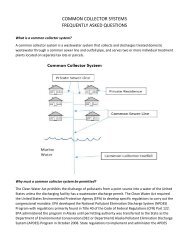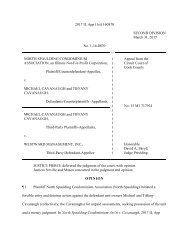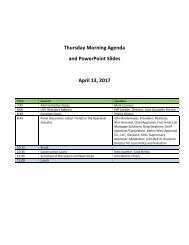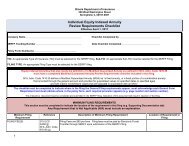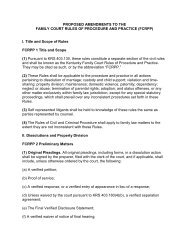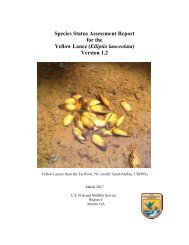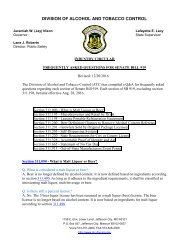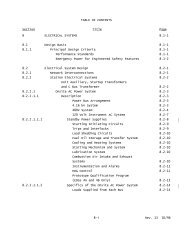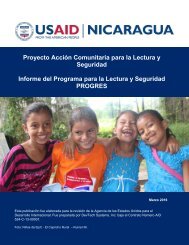Gender Integration
pbaae696
pbaae696
Create successful ePaper yourself
Turn your PDF publications into a flip-book with our unique Google optimized e-Paper software.
• Building local capacity for gender integration. Train<br />
local officials and government service providers in gender<br />
analysis and gender-responsive budgeting, in order to better<br />
align community needs with resources and improve the<br />
efficacy of public spending.<br />
• Participation of civil society. Build the capacity of local<br />
women’s organizations and CSOs representing marginalized<br />
communities to more actively engage in official and unofficial<br />
consultation, planning, and implementation processes<br />
around public services.<br />
• Civil society monitoring of local government.<br />
Strengthen CSOs’ capacity to monitor public services<br />
and hold local government accountable. Such efforts may<br />
include community scorecards, public surveys, and direct<br />
solicitation of user feedback.<br />
3. Decision-making and political participation<br />
Challenge: Creating gender equitable and inclusive<br />
decision-making bodies.<br />
Opportunities:<br />
• Affirmative measures. Support efforts to conduct analysis<br />
and identify options with regard to affirmative measures (for<br />
example, quotas or reserved seats) to increase the number<br />
of women and traditionally marginalized communities in<br />
local decision-making bodies.<br />
• Supporting elected women at the local level. Provide<br />
training and capacity building to local elected women to<br />
enhance their ability to effectively legislate, negotiate,<br />
advocate, provide oversight, raise their public profile, and<br />
better represent their constituents.<br />
• <strong>Gender</strong> audits. Provide training to local governments to<br />
conduct gender audits to assess where strengths and weaknesses<br />
exist with regard to gender equality and inclusion.<br />
Build their capacity to take concrete steps to address areas<br />
of weakness and to create more inclusive governance bodies.<br />
This may include changing meeting locations, meeting<br />
times, revising recruitment and hiring policies, and/or instituting<br />
anti-sexual harassment policies and procedures.<br />
Challenge: Increasing women’s participation in local<br />
governance.<br />
Opportunities:<br />
• Political parties. Work with political parties to recruit,<br />
train, and support women as candidates, campaign managers,<br />
and party poll watchers. Support political parties in<br />
creating or revising policies to enact quotas or other special<br />
measures to promote gender equity and inclusion among<br />
their leadership and candidates. Build the capacity of political<br />
parties to engage in self-assessment and take action to<br />
create more equitable and diverse parties at the local level.<br />
• Supporting women to run for office. Hold trainings<br />
or campaign schools for women and girls interested in<br />
running for local office. Trainings might target young women,<br />
PROGRAM SNAPSHOT<br />
In Cambodia, commune councils play<br />
an important role in local governance,<br />
resource management, public security,<br />
and public services. While the number<br />
of women commune councilors has<br />
increased in each of the three commune<br />
council elections since 2002, the<br />
overall percentage of women holding<br />
these positions remains very low. With<br />
support from the European Union, the<br />
Asia Foundation and Women for Prosperity<br />
have worked to build the capacity<br />
and confidence of women commune<br />
councilors from 106 communes so that<br />
they are able to increase their effectiveness<br />
and influence on decision-making<br />
in their districts.<br />
Through a series of participant-led<br />
fora on topics including land conflicts,<br />
divorce, violence against women,<br />
maternal health, and education, women<br />
councilors were able to share best practices<br />
and institutionalize a peer support<br />
network of women leaders. The project<br />
has also helped to strengthen the women’s<br />
capacity to advance policies and<br />
secure resources critical to the needs of<br />
women and children in their communes.<br />
Prior to the fora, only 60 percent of the<br />
participants reported having the confidence<br />
to express their opinions during<br />
council meetings. Afterwards, 97 percent<br />
said they were more confident and<br />
reported receiving additional committee<br />
assignments as the commune chiefs<br />
recognized their increased effectiveness.<br />
Source: Samneang, Moul. “Cambodia’s<br />
Local Women Leaders Take Charge,”<br />
The Asia Foundation, March 6, 2013.<br />
http://asiafoundation.org/2013/03/06/<br />
cambodias-women-local-leaders-take<br />
-charge/<br />
44<br />
USAID | <strong>Gender</strong> <strong>Integration</strong> in Democracy, Human Rights, and Governance (DRG) Programming Toolkit



